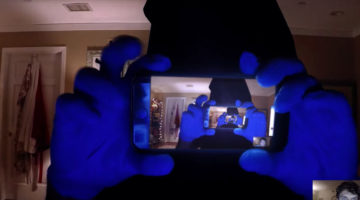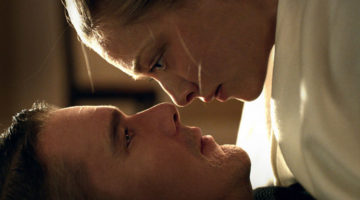Review: Crimson Peak
It’s only for so long that Victorian dresses, eerie houses, and the captivating faces of Tom Hiddleston and Mia Wasikowska distract you in Crimson Peak. Try as hard as they might, and they do well, this would-be fantasy horror from Guillermo del Toro is full of plot holes and silliness, a melodramatic soap opera with a focus on bits and pieces in lieu of a coherent whole.
In upstate New York, the bookish daughter of town leader finds tragedy for the second time in her life. Edith, as narrator, explains she believes in ghosts, having been visited as a child by her deceased mother following a tragic death. The startling appearance came with a terse warning, one that was similarly echoed again many years later. Now, why such a omen was especially cryptic, and why she needs to appear as something scary is another matter.
Some ten years later or so, Edith finds herself adored by a dashing Englishman seeking investors for a mining project. Thomas Sharpe, played with charm and sympathy by Mr. Hiddleston, appears earnest in his feelings, though Edith’s protective father wants none of it. A doting doctor (Charlie Hunman) is certainly disappointed too. It seems Thomas’s lurking sister Lucille, a one-note sinister Jessica Chastain, isn’t particularly fond either. And again, that warning comes, unnecessarily terrifying.
Well, Edith soon finds herself without family and a home (predictably, though it takes time to get there), and so marries Thomas, whisked away to surely the worst country home there is to live with him and a menacing sister-in-law.
As Thomas explains, in one of the many instances of laborious exposition, this dilapidated mansion is miles away from any neighbor or town; what’s more, the clay mine upon which it rests makes faucets run red, walls bleed, and the snow look bloodied. It’s impeccably detailed and chilly, literally crumbling to the ground, but like so much in Crimson Peak, not utilized to its fullest potential, hurt by a weak story.
Naturally, the house is haunted as shiny ghosts screaming in pain pop up for reasons unknown. Little adds up in this film that without its gorgeous façade would be instantly dismissed. Running on tropes made none the more remarkable, this haunted house tale features creaky doors, evil looks, and plenty of questions, like why are all these leaves falling into the hole in the ceiling if there are no trees around? And why is Edith’s dead mother able to tell the future? And couldn’t she be more specific? And perhaps if Thomas and Lucille have secrets, they could do a better job keeping them as such; ‘never go down there’ seems a weak-willed directive.
Del Toro appears to not care for any of the plethora of head-scratching incongruities. Instead, he opts for excessive gore and loud noises to unnerve, and the most beautifully unnerving estate to enchant. To his credit, he makes the women strong and in control, while the men are plagued with both emotions and powers they can’t comprehend.
Perhaps though a tacit admission that the script he co-wrote with Matthew Robbins is lacking, he makes Edith a writer. Her manuscript is a not a ghost story, she professes, but instead a story that happens to include a ghost, one that is about shedding the past and seeking love in the present. The parallels!
[star v=2]






